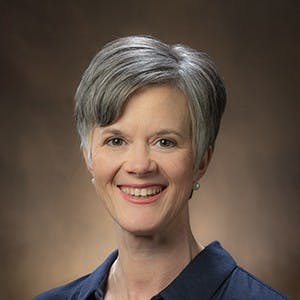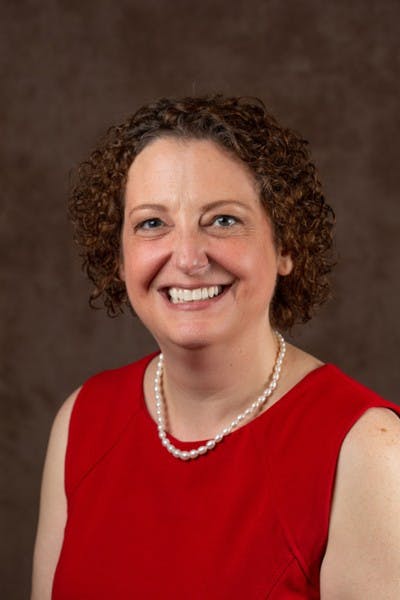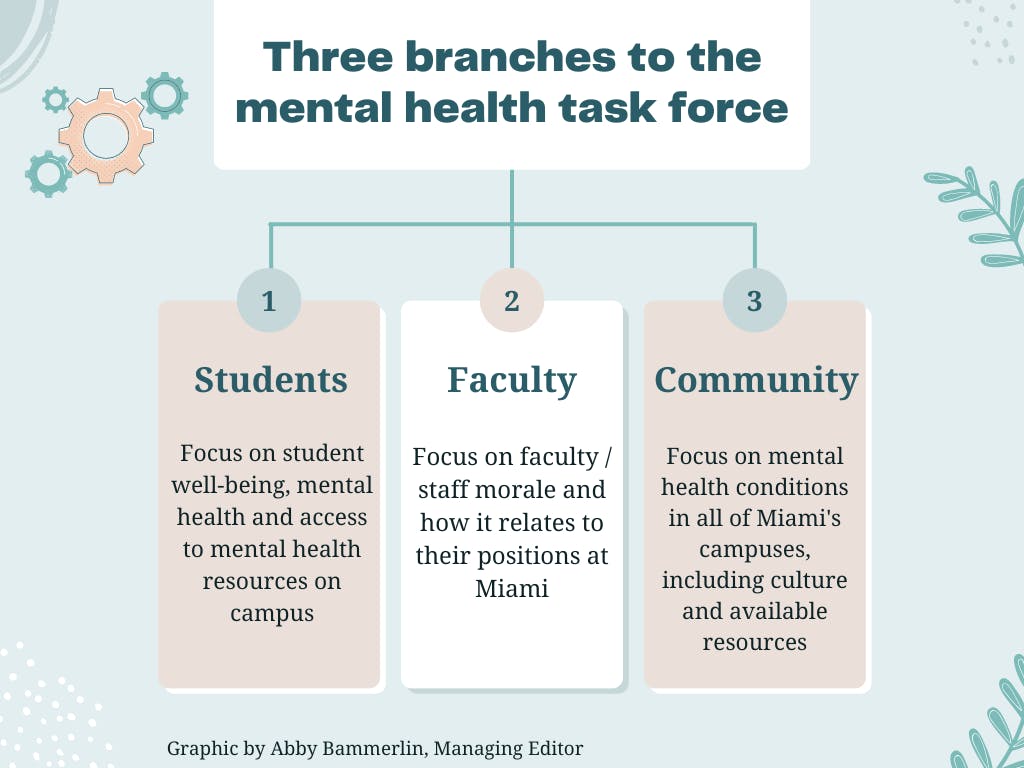In January 2021, the American Psychological Association, in response to numerous reports of declining emotional health across the country, declared a “National Mental Health Crisis.”
To combat this, Miami University has established the Institutional Task Force on Student, Faculty, and Staff Mental Health and Well-being, a group dedicated to researching the mental health conditions at Miami and finding potential solutions to combat them.
Miami has been investing in student and faculty mental health for some time now, including a new mental health fee for students that directly funds prevention, treatment and response initiatives.
Demand for mental health services has increased alongside new resources.
Miami’s annual Student Health Survey showed a significant rise in feelings of anxiety, depression and suicidal thought in the 2021-22 school year. Additionally, the usage of clinical services at Miami’s Student Counseling Center (SCS) increased by 17% between the academic years of 2020-21 and 2021-22.
Establishing leadership
Under direction from Miami President Greg Crawford, a team was assembled to investigate the current state of mental health at Miami. The group was hand-picked for their experience and interest in the subject, and consists of faculty and staff from both Miami’s Oxford campus and its regionals.
Jayne Brownell, vice president for Student Life, is co-chair of the task force alongside Brooke Flinders, interim regional associate dean.
“As we came into this year, President Crawford charged us to think more broadly about the community as a whole,” Brownell said. “Not just the mental health fee and what we do in terms of money and resources and hiring, but let’s look at the whole culture of Miami.”

Brooke Flinders is leaving her postition as associate provost to become president of Frontier Nursing University.
Enjoy what you're reading?
Signup for our newsletter
Brownell and Flinders oversee the task force, leading biweekly meetings discussing its findings and communicating directly with Crawford about its process. A major goal of the task force is to look at Miami’s mental health problems holistically, focusing not just on students but on faculty, staff and the wider communities Miami touches.
“We know that faculty and staff have also been dealing with their own mental health and well-being,” Brownell said. “There is more awareness that you have to keep the people who provide the support well, or they are not going to have the capacity to help students.”

Jayne Brownell, one of the co-chairs of the task force, said one of their major goals is to look at Miami's mental health problems holistically.
Along with Brownell and Flinders, three workgroups were established within the task force, each with their own co-chairs and focusing on a specific population within Miami. These workgroups each have their own individual meetings featuring discussions with members of the Miami community about their area of interest.

A focus on students
The first workgroup, “Student emotional health and well-being,” is dually led by John Ward, director of SCS, and Claire Ruberg, senior regional director of Clinical Services.
“My role is to help facilitate the dialogue around helping us think specifically for students,” Ward said. “It’s for me to help get this group of students, faculty and staff thinking about, ‘How do we advance this for students?’”
Ward’s decades of experience in student mental health studies have allowed him to observe a rise in the mental health services requested at Miami.
One thing Ward attributes to the increase in requests for student counseling is a higher awareness of the importance of mental health, as well as a destigmatization of conversations surrounding the subject.
“When I first got into this, I would always have a conversation with students about, ‘Hey, if you happen to see me on campus I’m not going to out you, that you’re a client or things like that,’” Ward said. “In recent years, I’ve had instances where students had been walking with a group of friends, have seen me, and said, ‘Hey, that’s my therapist,’ and kept going.”
A focus on faculty
The second workgroup, “Faculty and staff emotional health well-being,” is headed by Cricket Meehan, director of the Center for School-Based Mental Health Programs, and Sharon Custer, research scientist for the College of Education, Health and Society.
“Last year … in our president’s cabinet meetings, we were having more and more conversations about faculty and staff turnover, and morale and people being stretched by what was going on with COVID and in the world, at home and at work,” Brownell said.
Academic research into university employee well-being from 2021 indicates that academic faculty are uniquely susceptible to work-related stress, burnout and mental health issues compared to other professional positions. Much of this has been exacerbated by the pandemic.
Brownell said she hopes the task force’s work in this area sheds some light on what may be causing these problems within Miami’s staff and what can be done to improve them.
“Part of what I’m looking forward to is changing the conversation, to broaden it to all members of our community,” Brownell said. “To increase the openness of faculty and staff to talk about this so that they are allowed to be emotionally well, as well as talk about their mental health.”
A focus on community
The final workgroup is “Community well-being,” co-chaired by Steve Large, assistant vice president of Student Life for Health and Wellness, and Dee Kinney, assistant professor in the Department of Education and Society.
“The community workgroup is looking at the overall Miami community, inclusive of regional campuses, Oxford [and] online,” Large said. “It’s also looking at the near neighboring communities as well, and our relationship with them.”
Large said identifying the culture of Miami and its surrounding communities is key to understanding mental health in its residents. This involves hearing the perspectives of everyone who falls in its vicinity.
“We have representation from all those groups, from faculty, staff, students and from folks that are from Oxford and regionals,” Large said. “There was an intentional effort to make sure that the workgroup was representative of the community that we were serving.”
The task force will continue to meet regularly until April of next year, by which time they will have put together a report recommending next steps to be reviewed by Crawford and his executive cabinet.
Though the task force is still in its early stages of planning, Large believes its existence at all speaks volumes.
“This task force is such a strong testament to the reality that mental health is a lived value here,” Large said. “To have a task force charged by the president is no small feat.”




